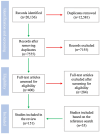Acceptance of Illness and Health-Related Quality of Life in Patients After Myocardial Infarction-Narrative Review
- PMID: 39941398
- PMCID: PMC11818487
- DOI: 10.3390/jcm14030729
Acceptance of Illness and Health-Related Quality of Life in Patients After Myocardial Infarction-Narrative Review
Abstract
Introduction: Cardiovascular diseases, particularly myocardial infarction (MI), significantly impact patients' lives, causing stress and prompting varied responses to illness. Aim and methods: We conducted a narrative review concerning the acceptance of illness and quality of life in post-MI patients. Based on an extensive search of the available literature, this review consolidates current evidence on the proposed topic. Conclusions and implications: While some patients struggle with acceptance and face emotional distress, others who accept their condition are more likely to engage in treatment and lifestyle changes, leading to an improved health-related quality of life (HRQoL). Following an MI, patients often experience depression, anxiety, and stress, complicating their acceptance of the illness. Risk factors, such as hypertension, diabetes, and smoking, play a significant role in influencing HRQoL in post-MI patients. An accurate assessment of HRQoL is crucial for tailoring effective treatments and support strategies to enhance patient outcomes and identify those most at risk of developing post-MI depression or anxiety. Effective physician-patient and nurse-patient communication and support from family might be helpful in recovery. Cardiac rehabilitation improves patients' outcomes and HRQoL. This review underscores the importance of integrating psychological support with optimal medical care to improve patient prognosis and enhance the HRQoL of individuals recovering from MI. The healthcare system could implement routine psychological assessments for MI patients at admission and discharge to establish a baseline for follow-up. Future research should explore effective psychological interventions, the interplay of CVD risk factors and psychosocial aspects, the emerging role of artificial intelligence in personalized care, and the cost-effectiveness of integrated treatment models.
Keywords: acceptance of illness; health-related quality of life; myocardial infarction; rehabilitation.
Conflict of interest statement
The authors declare no conflicts of interest.
Similar articles
-
Behavioural modification interventions for medically unexplained symptoms in primary care: systematic reviews and economic evaluation.Health Technol Assess. 2020 Sep;24(46):1-490. doi: 10.3310/hta24460. Health Technol Assess. 2020. PMID: 32975190 Free PMC article.
-
Correlates of health-related quality of life in patients with myocardial infarction: A literature review.Int J Nurs Stud. 2017 Aug;73:1-16. doi: 10.1016/j.ijnurstu.2017.04.010. Epub 2017 May 4. Int J Nurs Stud. 2017. PMID: 28511032 Review.
-
Promoting and supporting self-management for adults living in the community with physical chronic illness: A systematic review of the effectiveness and meaningfulness of the patient-practitioner encounter.JBI Libr Syst Rev. 2009;7(13):492-582. doi: 10.11124/01938924-200907130-00001. JBI Libr Syst Rev. 2009. PMID: 27819974
-
Prevalence and influencing factors of chronic post-traumatic stress disorder in patients with myocardial infarction, transient ischemic attack (TIA) and stroke - an exploratory, descriptive study.BMC Psychiatry. 2021 Jun 7;21(1):295. doi: 10.1186/s12888-021-03303-1. BMC Psychiatry. 2021. PMID: 34098930 Free PMC article.
-
Depression following myocardial infarction--an overseen complication with prognostic importance.Dan Med J. 2013 Aug;60(8):B4689. Dan Med J. 2013. PMID: 23905572 Review.
Cited by
-
U-shaped association between average daily sleep duration and depression among individuals with hypertension: a cross-sectional study based on NHANES 2017-2020.BMC Psychiatry. 2025 Jul 1;25(1):608. doi: 10.1186/s12888-025-07075-w. BMC Psychiatry. 2025. PMID: 40597928 Free PMC article.
-
Perception of Social Support and Disease Acceptance Among Patients Undergoing Cardiac Rehabilitation-Cross-Sectional Study.Healthcare (Basel). 2025 May 4;13(9):1059. doi: 10.3390/healthcare13091059. Healthcare (Basel). 2025. PMID: 40361837 Free PMC article.
References
Publication types
LinkOut - more resources
Full Text Sources


